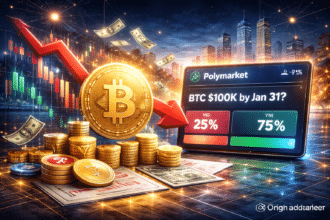The term “Paper Bitcoin” has garnered considerable confusion among the crypto community as it is frequently associated with deceitful actions such as exchanges selling coins they do not possess. Nonetheless, the truth is more intricate – and lawful. Paper Bitcoin commonly denotes to agreements for derivatives that indicate to Bitcoin exposure without the physical transfer of BTC.
Derivatives markets, which include futures and options, differ from spot trading in that no actual Bitcoin is handed over. However, these markets allow traders to speculate on BTC price movements without owning the asset. These financial instruments are completely regulated in most regions and are widely used by both institutional and retail investors for hedging, leverage, and speculation.
In fact, derivatives trading has escalated above the spot market by a large margin. Based on the latest industry reports, the trading volume for Bitcoin derivatives is currently over six times that of spot trading. This substantial increase has driven a market both liquidity and volatility to a great extent while also causing worries about how much real Bitcoin is backing the total trading activity.
Detractors say that these high leverage and synthetic exposure may lead to distortion of price discovery, especially at times of high speculation or market stress. While some claim that paper Bitcoin improves market efficiency by providing the investors with the flexible instruments for both risk-taking and management.
Paper Bitcoin is different from unbacked reserves or the selling of fraud. The best exchanges and institutional platforms strictly abide by proper guidelines to ensure all contracts are collateralized, monitored, and cleared according to financial regulations.
It has also drawn regulatory concern over the increasing use of paper bitcoin. In recent months, the global financial watchdogs have had calls for transparency in crypto derivatives markets to deter systemic risks and effect fair pricing mechanisms.
And as the bitcoin ecosystem matures, so will the importance of knowing which is real and which is paper when it comes to BTC, something fundamental to an investor. Paper bitcoin is not a scam; it is a very important part of the developing financial infrastructures surrounding digital assets.
Also Read: ETH 10 Years: Is $4,000 the Next Target for Ethereum?












